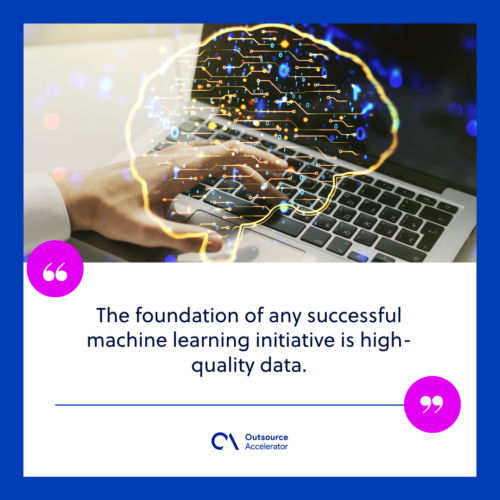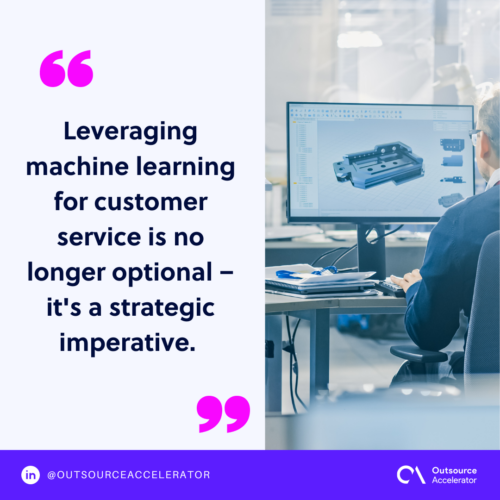Machine learning for customer service: Implementation, benefits, and challenges

In a world of rising customer expectations, businesses strive for innovative ways to improve customer service. Machine learning, for one, is a game-changing technology that’s transforming customer support.
Statista revealed that 57% of companies and businesses employ machine learning to enhance customer satisfaction. Further, 65% of firms intending to integrate machine learning assert that the technology aids in business decision-making.
But what exactly is machine learning for customer service, and how can it be implemented effectively?
Let’s delve into this innovative approach, exploring its benefits, challenges, and strategies for maximizing customer satisfaction.
What is machine learning for customer service?
Imagine having a personal assistant who resolves customer queries efficiently, accurately, and around the clock. That’s the essence of machine learning for customer service.
Unlike traditional methods that rely heavily on human intervention, machine learning empowers businesses to:
- Automate processes
- Analyze data patterns
- Deliver personalized support experiences
How do you implement machine learning for customer service?
Implementing machine learning for customer service involves several key steps to ensure successful integration and optimization.
Define objectives and use cases
The first step is to define clear objectives and use cases for its application in customer service.
Ask yourself: What specific problems or pain points do you aim to address? Are you looking to automate repetitive tasks, enhance personalization, or improve issue resolution?
When you define your objectives and identify relevant use cases, you can align your machine-learning efforts with your business goals.
Data collection and preparation
The foundation of any successful machine learning initiative is high-quality data. Begin by gathering pertinent information from a range of sources, including:
- Customer interactions
- Feedback surveys
- Purchase history
Ensure that the data is clean, accurate, and represent your target audience. It may involve preprocessing, like data cleaning, normalization, and feature engineering.

Select and train models
Once you have collected and prepared your data, the next step is to select and train machine learning models.
Depending on the nature of your problem, you may choose from a range of algorithms, such as:
- Decision trees
- Support vector machines
- Neural networks
Train these models using labeled data and fine-tune their parameters to optimize performance and accuracy.
Integration with customer service systems
Integrating machine learning models into your existing customer service systems is crucial for seamless operation.
Make sure your chatbot or predictive analytics engine integrates smoothly with your CRM, ticketing, and communication platforms.
Work closely with your IT and development teams to implement robust APIs and data pipelines for smooth data flow between systems.
Testing and evaluation
Before deploying machine learning models into production, you must conduct thorough testing. Utilize historical data or simulated scenarios to assess accuracy, reliability, and scalability.
Use A/B testing to compare machine learning and traditional approaches and gather pilot user feedback.
Deployment and monitoring
Once you’re satisfied with the performance of your machine learning models, it’s time to deploy them into your live customer service environment.
However, deployment is just the beginning – ongoing monitoring and optimization are critical for long-term success.
Set up robust monitoring systems to track key performance indicators (KPIs), such as:
- Response times
- Customer satisfaction scores
- Resolution rates
Continuously analyze feedback and usage data to identify areas for improvement and make iterative adjustments as needed.
Iterate and improve
Machine learning for customer service is not a one-time implementation – it’s an iterative process of continuous improvement.
Solicit feedback from both customers and support agents to identify pain points, bottlenecks, and opportunities for enhancement.
Benefits of using machine learning for customer service
Below are some of the key advantages of using machine learning for customer service:
Personalized interactions
One of the most significant benefits of leveraging machine learning is to deliver personalized interactions.
Machine learning algorithms analyze extensive customer data, such as past interactions and purchase history. This approach customizes responses and recommendations for each customer.

24/7 availability
Machine learning-powered solutions offer businesses 24/7 customer support, unlike human agents limited by working hours and time zones.
These systems are accessible over time for:
- Answering inquiries
- Troubleshooting
- Offering product recommendations
- Ensuring customers receive assistance whenever needed
Efficient issue resolution
Machine learning algorithms excel at automating routine tasks and streamlining workflows. It reduces response times and accelerates problem resolution by:
- Categorizing support tickets
- Routing inquiries
- Providing instant solutions through chatbots
This efficiency improves customer experience and allows human agents to focus on complex issues, enhancing overall productivity.
Predictive analytics
Another significant benefit of machine learning for customer service is its ability to leverage predictive analytics.
Machine learning algorithms analyze historical data to anticipate customer needs, behaviors, and preferences by identifying patterns and trends.
This predictive capability empowers businesses to:
- Address issues proactively
- Offer targeted promotions
- Optimize resource allocation
Sentiment analysis
Understanding customer sentiment is crucial for delivering exceptional service and building strong relationships.
Machine learning algorithms can analyze text data from customer interactions, including emails, chat transcripts, and social media posts.
Cost reduction
Implementing machine learning in customer service can lead to significant cost savings for businesses. Machine learning automates tasks, reducing operational costs.
Challenges of using machine learning for customer service
While machine learning offers numerous benefits for enhancing customer service, its implementation comes with several drawbacks that businesses must address:
Data quality and quantity
One of the challenges in implementing machine learning for customer service is ensuring the quality and quantity of data.
Machine learning algorithms depend on quality data for accurate results.
However, businesses often face issues such as incomplete, inconsistent, or biased data, which can hinder the effectiveness of machine learning models.
Algorithm bias and fairness
Machine learning algorithms are biased based on the data they’re trained on, potentially leading to unfair treatment or inaccurate predictions.
Biases may arise due to unrepresentative data samples, historical inequalities, or implicit assumptions in the algorithm design.
Complexity and interpretability
Machine learning models can be inherently complex, making it challenging to interpret their decisions and outputs.
Lack of transparency and interpretability presents challenges, especially in customer-facing applications requiring explainability.
Integration and deployment
Integrating machine learning into existing customer service systems can be a complex and time-consuming process.
Compatibility issues, data migration challenges, and system dependencies may arise during deployment, requiring careful planning and coordination.
Training and expertise
Building and maintaining machine learning capabilities requires specialized skills and expertise, including:
- Data Science
- Machine learning engineering
- Domain knowledge in customer service
However, many businesses lack the necessary talent and resources to develop and deploy machine learning models effectively.
Maximizing customer satisfaction through machine learning
Leveraging machine learning for customer service is no longer optional – it’s a strategic imperative.

By embracing advanced algorithms and data analysis techniques, businesses can unlock new levels of efficiency, personalization, and innovation in their customer support operations.
From automated chatbots to predictive analytics, the possibilities are endless.
However, success requires careful planning, ongoing optimization, and a commitment to delivering exceptional customer experiences.







 Independent
Independent




